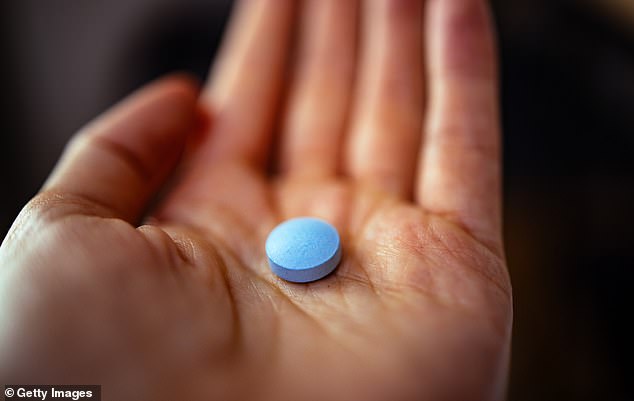Experts are warning people against taking the little blue pill celebrities promise will calm nervous jitters in all sorts of stressful situations, from first dates to the Golden Globes.
First approved by the Food and Drug Administration (FDA) to treat symptoms of cardiovascular disease, propranolol has become the go-to pill for reducing anxiety and steadying nerves.
But experts say the miracle pill will do little for persistent anxiety and panic attacks, and could even raise the risk of death.
Like other beta blockers, propranolol works by altering the way the body responds to nerve impulses, including in the heart.
Medically known as beta adrenergic blocking agents, the pills work by blocking the effects of adrenaline and noradrenaline on the body’s beta receptors, which helps reduce heart rate, lower blood pressure and diminish the force of heart muscle contractions.
Licensed to be prescribed to treat irregular heartbeats, beta blockers act on the beta adrenergic system, thus temporarily blocking the body’s response to stress so are very effective at reducing the symptoms of anxiety.
This in turn can help alleviate physical symptoms of anxiety such as sweating, shaking and heart palpitations.
‘They work by reducing the effects of adrenaline on the heart, so you don’t get that heart-racing feeling, you may not get short of breath or sweaty, and they can reduce the symptoms of a full-blown panic attack,’ said Dr Amir Khan, an NHS GP.

Celebrities have been name dropping the pill as the answer to situational anxiety

During his 2024 Golden Globes acceptance speech Robert Downey Jr. admitted to popping a pill before taking the stage saying: ‘I took a beta blocker, so this is going to be a breeze.’
However, a recent study found that whilst propranolol may help ease physical symptoms of anxiety, there is limited evidence that it outperforms other anti-anxiety drugs.
At red carpet events this year, Kristen Bell, Rachel Sennott and Natasha Rothwell all credited beta-blockers for their relaxed demeanour, following in the footsteps of Robert Downey Jr. who allegedly popped a beta blocker before making his Golden Globes acceptance speech.
And actress Rachel Sennott’s advice to ‘take that beta blocker, girl’ has echoed as a battle cry for women struggling with anxiety disorders to take matters into their own hands.
Compared to other anti-anxiety treatments like benzodiazepines—such as Xanax or Valium—which are extremely addictive, propranolol is among the ‘mildest variety of anti-anxiety medication,’ according to Dr Nassir Ghaemi, an academic psychiatrist and professor of psychiatry at Tufts University School of Medicine.
But, it is not without risk he told The Wall Street Journal.
Prescriptions for anti-anxiety medications have skyrocketed in recent years, driven mainly by increases in women and young people who report experiencing anxiety disorders at higher rates—but as when any drug crosses over into popular culture, prescriptions reliably rise.
According to experts at the University of Bristol’s medical school which looked as prescriptions issued for anxiety, patients perhaps concerningly did not consider beta blockers to be “mental health drugs”, and therefore perceived them as less stigmatising.
Despite the anecdotal evidence from a swathe of celebrities—with Khloe Kardashian admitting to borrowing her mother Kris Jenner’s pills to calm her nerves—experts say there is no conclusive evidence for the effectiveness of beta blockers to treat anxiety.

Actress Rachel Sennott is also a purporter of the trend, telling her fans to ‘take that beta blocker. Girl, swallow it down and lock in.’
They are also not included in guidance from the National Institute for Health and Care Excellence (NICE). Yet doctors are still prescribing them.
According to Dr Khan, many GPs will prescribe beta blockers for situational anxiety—for when someone knows they are going to be in a situation that is a trigger for them.
‘So if and when rather than long term,’ he said.
For patients with heart conditions, beta blockers can be lifesaving, but its primary effects can be a double-edged sword.
Common side-effects include tiredness, dizziness and difficulty sleeping whilst more serious risks include heart failure, breathing difficulties and allergic reactions.
Dr Khan also warned that whilst beta blockers are not addictive, taking more than a prescribed dose can be dangerous.
He added: ‘If you’re taking them long her, you can’t suddenly stop them. And, they have been linked to higher rates of depression, so I wouldn’t prescribe them for anyone who has depression alongside their anxiety.’
It comes as a landmark study has suggested that heart attack patients are needlessly taking beta blockers, and the drug could even raise the risk of death.
It is estimated around 60,000 people are prescribed beta blockers every year in the UK and many will remain on the pills for life.
But new research has found the medication was ineffective, and did not help reduce the risk of further heart attacks.
In fact, women treated with beta blockers were found to have a higher risk of death, heart attacks or hospitalisation for heart failure compared to those not on the ‘miracle pill’.
